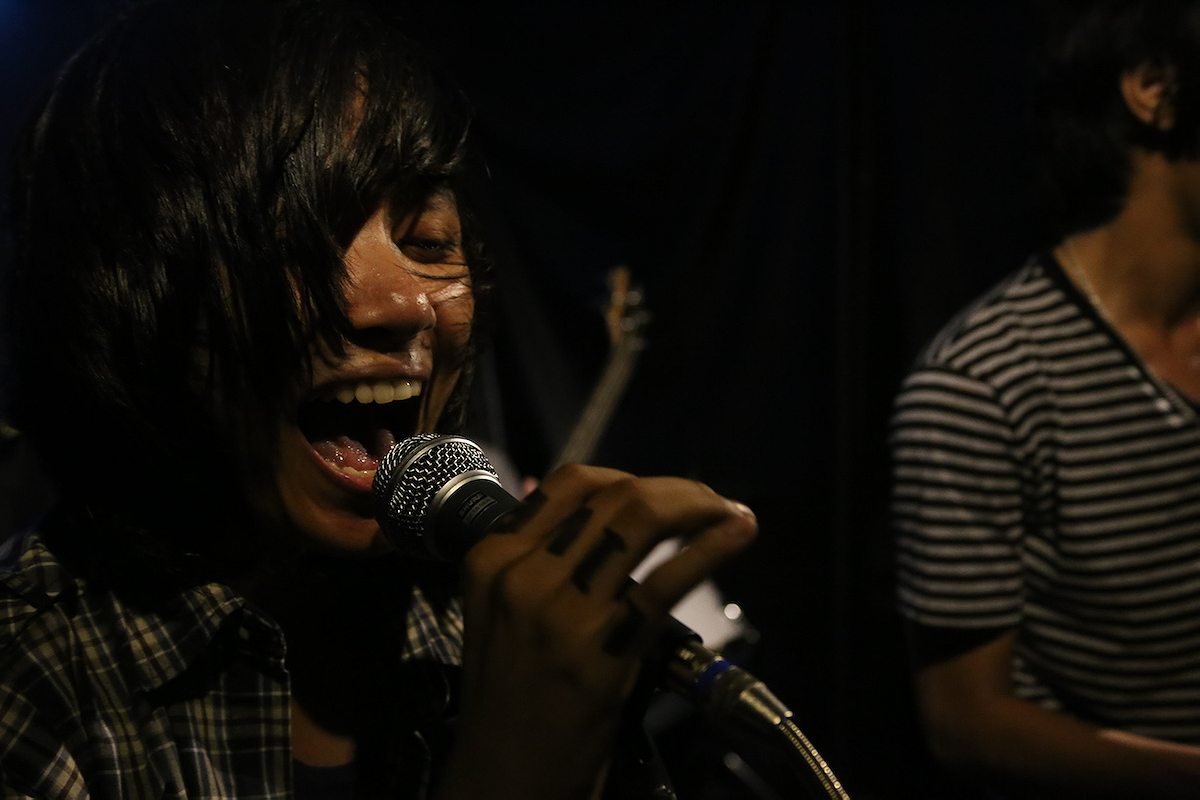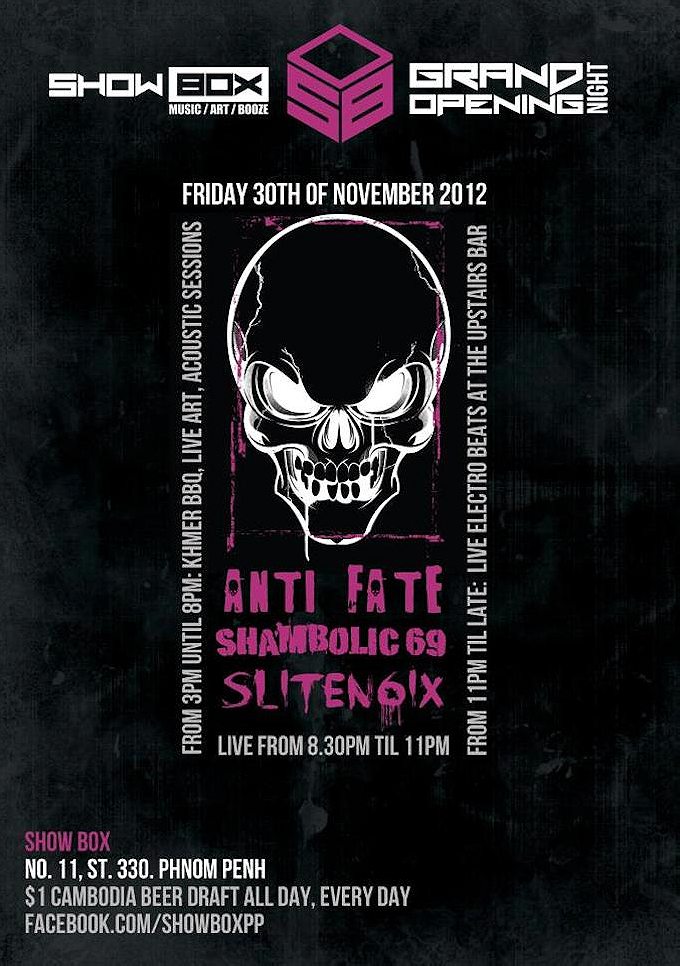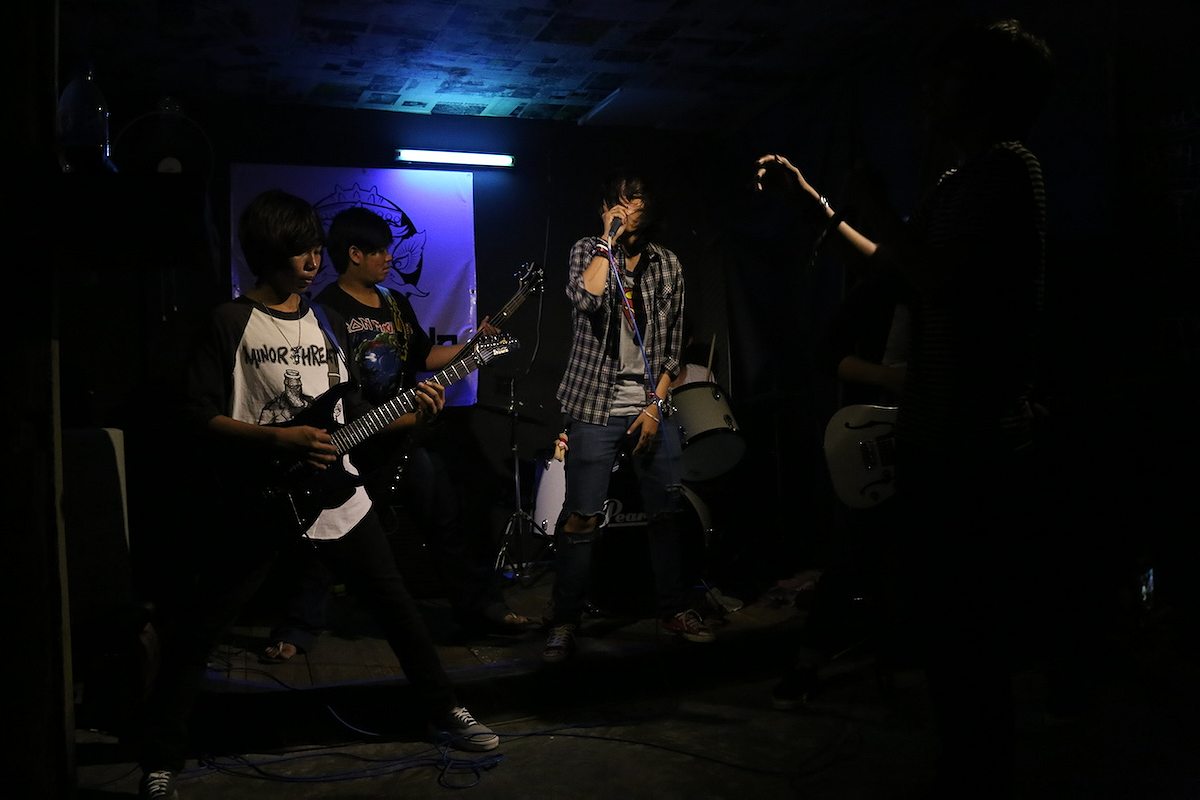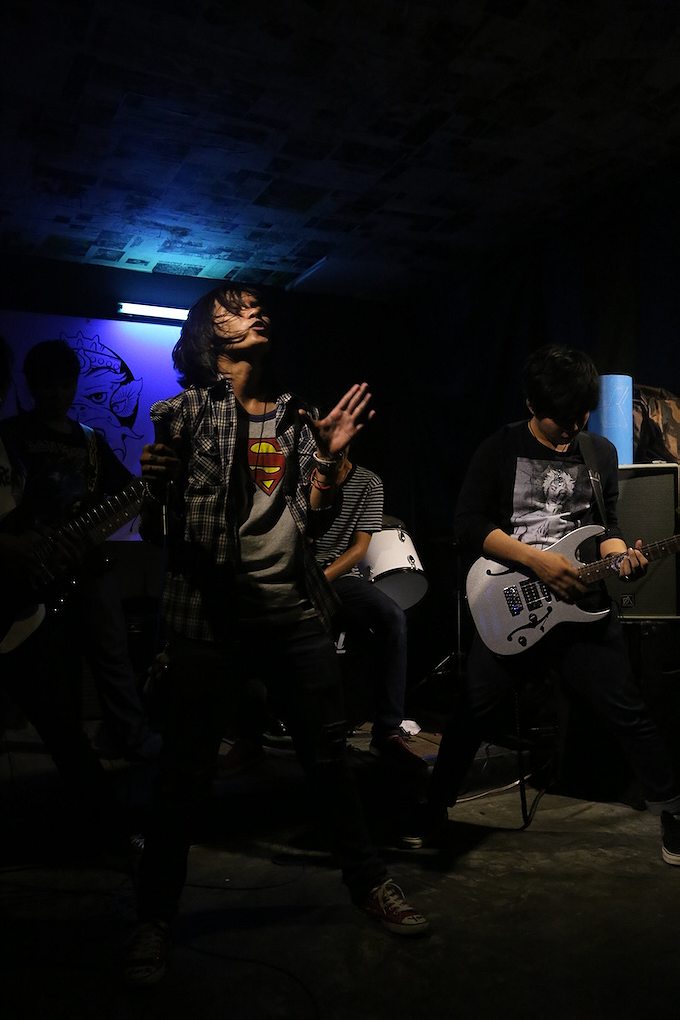Cambodia punk rockers: The Southeast Asian country is home to a new hardcore music scene.
PHNOM PENH, Cambodia—
Tin, the lead singer of Cambodia’s gnarliest rock band, slaps his friend on the shoulder and says, “Let’s get fookin pissed ya nobhead,” before downing the rest of his beer. The 21-year-old rocker, who has rarely left his native Phnom Penh, taught himself English by watching gangster films until he talked like a Manchester scallywag. His accent is wildly incongruous with his delicate Khmer-Chinese looks.
His band is called Sliten6ix, and it’s part of a handful of groups that form the nascent rock scene in Cambodia’s largest city. (According to Tin, the band’s name is a portmanteau that combines slit and sewn in order to describe the curative power of music; there are five members, with music forming a metaphysical sixth member.) They have no local music influences, as there is no history of rock music in Cambodia. The Southeast Asian country enjoyed a short-lived surf-rock scene in the 1960s, but the Khmer Rouge quickly crushed it.The scene, small as it is, resonates with the larger upheavals in Cambodian society—the unprecedented success of the leading opposition party, the Cambodia National Rescue Party, in last summer’s elections and the recent wave of mass protests show how increased education and Internet access have led people to begin to question the current authoritarian government. After decades of war and its aftermath, Cambodians are finding their voice.Thanks in part to that upheaval, there is, for the first time, a Cambodian hardcore, metal, and punk scene. Myley Rattle, a Kenyan-born poet and promoter who co-founded Yab Moung Records, Cambodia’s only rock label, tells me that the scene is similar to what New York was in the 1960s—really small and very original.

Rattle also runs Show Box, a bar that is home to the freaks and punks of Phnom Penh. Aptly located between an open sewer and the genocide museum, the bar has walls webbed with graffiti; Khmers and expats chat at the bar, and the stereo hums with hardcore ragga and rock. Khmer spoken-word artist Kosal Khiev turns up with his new purebred puppy and greets Conrad Keely, the frontman of And You Will Know Us by the Trail of Dead. Keely made his name in Austin, Texas, but is spending a lot of time in Phnom Penh these days. Show Box is cool but chaotic. Rattle’s newest venture at the bar—hosting Cambodian cooking classes—nearly failed when his chef passed out drunk. Luckily the lead guitarist from No Forever, a local band, stepped in to teach the team of foreign NGO volunteers how to cook Khmer mango curry.
Cambodian rock groups like the ANTI-Fate and Sliten6ix have found their efforts met with confusion. Cambodian society is conservative and hierarchical. The majority of the country is still living essentially a peasant lifestyle, where religion, family, and farming trump all. Rebellion and rock music is not so much scorned as disregarded. Most Cambodian kids listen to K-Pop or Cambodian singers whose videos always seem to end with a spurned boyfriend blasting the sky with a gun, his face twisted by heartbreak.
MOST CAMBODIANS HAVE NOT HEARD ABOUT PUNK OR HARDCORE MUSIC, AND EVEN IF THEY HAVE, THEY PROBABLY STILL DON’T GET THE POINT
Back at the bar, Tin is blasting his vocal chords onstage with Sliten6ix. He ricochets between shrieks and growls while the band ignites a blast furnace of guitars with experimental tempos and punishing breakdowns. “I used to be in a screamo band,” Tin tells me after the performance. “Y’know with screamin’ and singin’ at the same time? But then I decided fook that—I want even more hardcore.” Sliten6ix are followed by post-punk band No Forever, who include traditional Cambodian melodies in their heavy sound, somewhat reminiscent of System of a Down’s use of the Armenian scale. Both bands are signed to Yab Moung Records.

The Cambodian rock bands have not yet put out any official releases. The Yab Moung crew are working on a mix CD they plan to send out to industry contacts in England, Germany, and Australia. But apart from a small collection of Phnom Penh reprobates, no one else has heard their tracks.
Tom Reichelt, an expat from Leipzig, Germany, is the other half of Yab Moung Records. He tells me that most Cambodians have not heard about punk or hardcore music, and even if they have, they probably still don’t get the point. To put it more starkly, he estimates the rock scene is about 400 people in a country of 14 million.
Still, Cambodia has a young population—26 percent are between the ages of 16 and 30. Social media has become a powerful rallying point for youth movements, and the hardcore scene is no different. Fans interact online at the Cambo Headbanger Facebook group. It was started by scene linchpin Veasna, who runs a music school and lets bands record in his studio. He has long, straight hair; a Lamb of God T-shirt; and a reserved manner. He tells me that the Facebook group has grown from four to 272 members in the past two years—a large extended family of Phnom Penh rockers.
Sam, No Forever’s boyish female vocalist, tells me that her family doesn’t even know she’s in a band. Offstage, she’s quiet, almost elfin. But in Cambodia, women are expected to look feminine and marry boys, not dress like them. So when No Forever played on Bayon TV (a national TV appearance that her family didn’t see), critics on Facebook lashed out, saying that is wrong for a boyish girl like Sam to sing on TV. But Sam is undaunted. “Being in a band helps me to be myself, because when I’m up there singing, I don’t care what people think of me anymore,” she says.

The public reaction wasn’t surprising: Cambodian society has little tolerance for misfits. The country’s mores are still more geared to the collective than the individual. While Western influence is eroding such buttresses of Asian life, these differences remain. Western artists typically refer to the desire to “express themselves” when describing what they do. In Cambodia, their counterparts are still more likely to explain their art as furthering the common good.
Sam tells me that the songs she writes are meant to inspire positive social change. She had a troubled past and spent much of her teenage years at odds with her parents and her school, even dropping out for a short time. “When I was young, I did many bad things,” she admits. “Now I write songs for people who were like me, and I want them to know that it is possible to stop destroying yourself and take your life in a more positive direction.”
Like any capital city, Phnom Penh offers plenty of opportunities for vice. The problems are exacerbated by easy access to guns and methamphetamine—a drug frequently found in the bloodstreams of cops, taxi drivers, and revelers alike. Sam, who through music found an outlet for her youthful angst, is now teaching English and studying international relations.

Like Sam, Tin also stopped edging toward the cliff of self-destruction. “The music ’elps me to be myself,” he says. “I couldn’t go on fightin’ people and cursin’ people, so the music ’elps me to release that.” Rattle agrees: “If you go around screaming and roaring, people will lock you up. But if you take the rage onstage they will relate to it in a more positive way.”
In October, Sliten6ix played in Phnom Penh’s battle of the bands. Their three guitarists lined up like a firing squad while Tin detonated the mosh pit with horror show vocals. Their darkly Dionysian performance won them the $200 grand prize. After the show, they and No Forever took full advantage of the free bar. Things got blurry. They tumbled out of the bar into the Phnom Penh neon, just like kids anywhere else.
